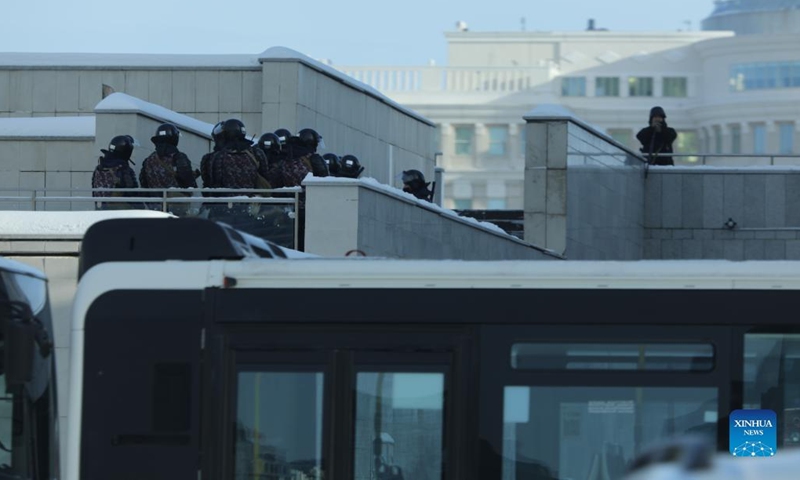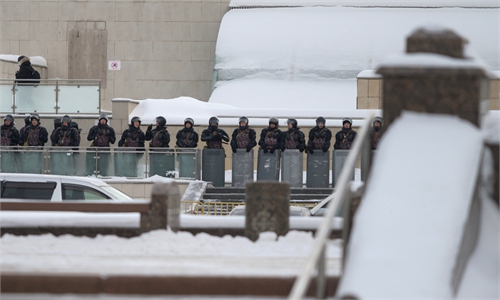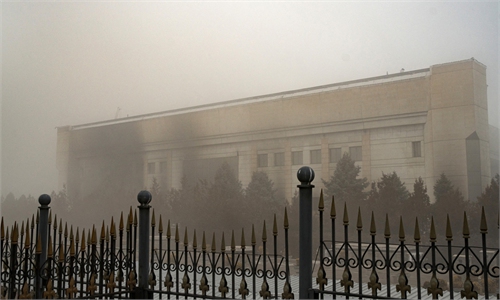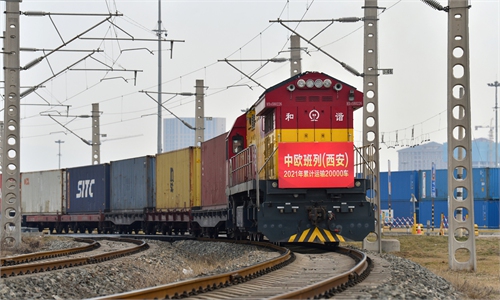
Military personnel patrol in front of the presidential palace in Nur-Sultan, Kazakhstan, Jan. 6, 2022. Kazakh President Kassym-Jomart Tokayev declared a state of emergency in the Kazakh city of Almaty and the Mangystau Region in southwest Kazakhstan on Wednesday. The mounting unrest prompted the Kazakh government to seek help from the Collective Security Treaty Organization, which has decided to deploy peacekeeping forces to Kazakhstan.(Photo: Xinhua)
Editor's Note:
After days of unrest in Kazakhstan, the largest country in the Central Asian region, the situation has begun to stabilize with the arrival of CSTO Collective Peacekeeping Forces. What are the reasons behind the violent protests? What lessons should regional countries learn? How will it change geopolitics in Central Asia? The Global Times interviewed experts from Russia and Kyrgyzstan for their views on these questions.
Dmitry Orlov, general director of the analytical center "East-West Strategy" in Kyrgyzstan
The root cause of the current turmoil is dissatisfaction with the social inequalities that have developed in Kazakhstan in recent years. If you judge by today's situation, you can see that there are three, at least, groups of influence with different goals and objectives operating in Kazakhstan. Initially, workers of oil refineries of Western Kazakhstan came out for peaceful rallies in protest against the increase of gas prices from 60 Kazakh tenge ($0.14) to 120 Kazakh tenge. This is serious money for Kazakhstan in crisis conditions.
Subsequently, the protest spread to other cities in Kazakhstan. In several cities, the initiative was taken by unknown terrorists, some of whom are reported to be foreigners. In Almaty, these people have carried out numerous pogroms, killing police officers, national guard service members and innocent civilians.
All this, of course, threatened the interests not only of Central Asia, but of Russia and China. However, the timely introduction of CSTO peacekeeping forces into Kazakhstan reduced these threats to a minimum. There are forecasts that the entire situation will be resolved within one or two weeks.
In general, all states of the former Soviet Union - not only those in Central Asia - need to urgently strengthen their own borders and enhance intelligence sharing. And, most importantly, socio-economic problems must be solved as a matter of urgency. Otherwise, there will be even more reasons for discontent with the authorities' policy.
Now everything depends on the efficiency and controllability of the CSTO peacekeeping forces and the special services of Kazakhstan. If they manage to eliminate terrorists, and if they do not prosecute those who rallied truly for socio-economic reasons, nothing terrible will happen to the region.
Of course, there will be difficulties. Because once the threats of new terrorist attacks are eliminated, it will be necessary to resolve problems with the restoration of infrastructure and economy in the affected regions of Kazakhstan. It will not be a quick process. But I want to believe that Kazakhstan's allies will provide all necessary help to the country.
Sergey Biryukov, a professor at the Siberian Institute of Management in Novosibirsk of Russia
As a result of an acute intra-elite struggle, supplemented by foreign interference (I emphasize in this regard the detention by the Kazakh authorities of the former head of the National Security Committee Karim Massimov on charges of treason), coupled with the activation of radical forces (together with ordinary participants of protests) inside the country, the statehood of Kazakhstan has found itself in a very severe crisis.
And Russia's participation, along with Kazakhstan's other CSTO allies, in overcoming an armed insurgency supported from the outside and threatening the security of ordinary citizens of Kazakhstan is not an attempt on the sovereignty of the country by Moscow, but necessary assistance to preserve it.
The former multi-vector strategy of Nursultan gave the US an additional opportunity to make influence on Kazakhstan. In addition to political ambitions, the US has a large-scale presence in the economy of Kazakhstan, primarily in the oil industry.
However, the acute crisis of the multi-vector format and the inevitable increase in the influence of Russia and China in this case cause some frustration in Washington.
It is becoming obvious that the US, which has focused today on other important foreign policy projects for itself, still fails to temporarily and manageably limit its presence in Kazakhstan with minimal cost to its reputation and influence. It seems that they simply did not calculate the possibility of such a dynamic development of events.
The use of Kazakhstan's strategic position within the framework of integration processes within "Greater Eurasia" could change the balance of forces on a global scale.
Such a large-scale and deep crisis in Kazakhstan will inevitably make Uzbekistan, which has preserved internal stability, the informal leader of the Central Asian region. In addition, the confidence of the Central Asian countries in each other will weaken due to the unwillingness to become an object of the "export of the color revolution" or simply instability from the nearest neighbors.
The internal integration processes will weaken even more in the current situation. On the other hand, in case of a successful settlement of the crisis in Kazakhstan, the influence and authority of Russia and China as countries contributing to the preservation of intraregional stability will increase. At the same time, a lot of things will depend on the ability of the political elites of Kazakhstan and other Central Asian countries to offer a comprehensive solution to the accumulated internal problems that give rise to such crises.



